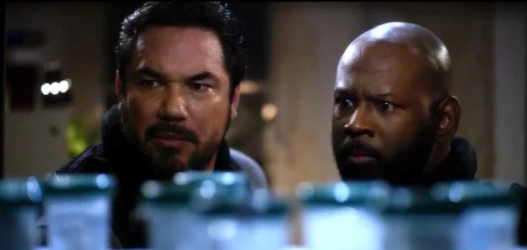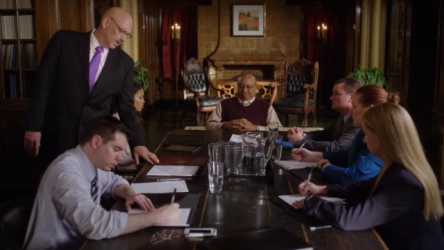Back in early 2014, Ann McElhinney and Phelim McAleer found their attempts to crowdfund for their movie about Kermit Gosnell, the Philadelphia abortionist and convicted murderer, stymied by capricious and inchoate guidelines from Kickstarter. (Sound familiar?) Gosnell was not a movie I wanted to see and I have considerable doubts as to the ultimate quality of crowdfunded movies generally speaking, but the unfairness of the action put me in a pique. How, I wondered, can they say they’re a platform if they’re aggressively editorializing? Pardon my naivete, but in my defense, it was 4 1/2 years ago.

Earl Billings as the avuncular, murderous Kermit Gosnell
When they moved to Indiegogo, I immediately chipped in $25, and have subsequently backed over a dozen other projects, because I’m semi-addicted to crowdfunding. But I don’t use Kickstarter if I can help it.
Despite having backed the project, I still didn’t want to see it. I like horror, I like gore, and I’ll happily munch popcorn through the worst Grand Guignol imaginable. But some subjects are not things I want to see, and abortion tops the list (along with rape and child abuse). So I didn’t go to the premiere, and I didn’t go on opening night. But The Flower and The Boy really did want to see it, so we braved the traffic to get to the overpriced AMC on Universal City Walk—the only theater playing it even remotely close to our area.
There’s a lot to talk about with this movie, but let’s get this out of the way first: It’s good. It’s very, very good. Not “good for a low budget movie” or “good for a values movie”. It’s just a good movie, a good watch, and one of the most moving experiences I’ve had in the theater in quite some time. And it achieves this, mostly, with amazing finesse and thematic juxtaposition. For example, our two lead characters are Detective James Wood (Dean Cain) and assistant D.A. Lexy McGuire (Sarah Jane Morris), and they’re both what used to be called “family men”. That is, despite having careers, they put their families first, or at least as first as possible given those particular jobs.

Dean Cain and Alfonzo Rachel as the detectives.
So as the revelations come, as the story plays out, they’re with their families—their children. Nobody ever verbalizes a “pro-life” argument. Nobody ever needs to. There’s one point, after they’ve discovered the severed infant foots, that Lexy is playing with one of her kids’ feet and is, well, let’s say unsettled. When we first meet him, Wood is giving away his daughter and the camera stays on him as he reluctantly lets go. It’s heart breaking, in that good, bittersweet way, and before he has any idea of Gosnell. Later, Lexy is pulled out of her daughter’s recital for news on the case.
Searcy shows virtually nothing gory. Even the feet are more conceptually horrifying—more evidence of Gosnell’s true nature as a serial killer—than graphic. Everything else is pure reaction shot. When Wood or McGuire must autopsy an infant to see if it has a brain, or when a baby’s photo is shown at the trial, we don’t see it—but we do see others’ reactions to it. This draws viewers into the emotion of the shot without repelling them (or inuring them) with the actual photos.
The actors carry a heavy load. And they’re all up to it. It’s a smaller role, but Wood’s partner is played by Alfonzo Rachel (of “Zo Nation” and “Zo Loft”) and he’s terrific, great chemistry with Cain. Michael Beach as the D.A. and Eleanor T. Threatt as the judge both take the position that “the trial is not about abortion/women’s reproductive rights”, the former seemingly out of fear they’ll lose the case and the latter out of political expedience.

Sarah Jane Morris as A.D.A Alexis McGuire
Defense lawyer Cohan (Searcy) on the other hand, wants to make it about abortion, because he knows he’ll win if he does. When Dr. North, a “reputable” abortionist (Janine Turner) details the acceptable practices in abortion, he does a fairly convincing Judo flip to paint Gosnell’s tactics as humane. Turner nails the kind of wide-eyed, progressive true-believer patter in a way that’s unsettling—because her character has also done thousands of abortions, but in a good way? Searcy’s Cohan is utterly focused on winning, and is otherwise a cipher, except for a brief moment during the Gosnell’s deposition where we can’t quite tell if even he is moved by the doctor’s enormity or if he’s just playing devil’s advocate.
Similar is (former Disney child star) Cyrina Fiallo’s Mollie Mullaney, a mash-up of Mollie Hemmingway and J.D. Mullane, who were instrumental in bringing what little attention the “local crime story” got. The implication, actually, is that Fiallo’s on the pro-choice side and she has certain markers (tattoos, hair coloring, antagonism) that suggest she leans left—but we never actually know because she’s doing real journalism. She’s the one who knows about Gosnell’s past (the Mother’s Day Massacre) and publicizes the photo of empty media seats in the courtroom.
In any politically consistent world, Gosnell would already be featured in a dozen horror movies, replacing Ed Gein (Psycho, Texas Chainsaw Massacre, The Silence of the Lambs) as the serial killer of choice. And one could say, Earl Billings, in the title role, doesn’t “do” much. Like Adolph Eichmann, he is utterly banal. Genial, even. He gets put out when his home is searched. Billings’ wide-eyed innocence tops even Turner’s, as he blandly eats his Chinese food out of the carton without taking off his bloody surgical glove. We know, that he knows, he’s done some illegal things. But at no point do we ever get the faintest idea that he conceives of himself as morally wrong. It’s a truly chilling—and accurate portrayal.

Nick Searcy’s Defense Team prepares as the confident Gosnell watches.
Sarah Jane Morris’ Lexy is the main character of the story, and she has to portray the struggle between the normal human reactions and her professionalism as an officer of the court. As the lodestone for the movie, she’s also the one the audience tends to identify with, as a kind of Everyman who has her worldview shaken. I don’t know her TV work, but she makes this look easy and natural. She should be in more movies.
At 93 minutes, this is a tight, tight movie. While the film’s low budget shows at the edges—certain scene transitions felt TV-movie-ish—what’s remarkable is how rare those moments are. There are films with literally 100 times the budget where less care was put into every character, every scene, every line of dialog. The camerawork and lighting is not showy, but it’s also not flat or lazy.
I had a particular interest in the score, because there were so many wrong ways to go about it. Despite the horror of the story, you can’t give it the Psycho treatment. Boris Zelkin’s approach was more akin to Howard Shore’s understated but ominous theme from Silence of the Lambs, and again the sort of thing you’d expect from a higher-budget film.
Of course, just as the story was buried, and just as the crowdfunding was suppressed, the usual suspects have been busily burying this movie. Ann and Phelim managed to get it into an amazing 600 theaters (with a lot of elbow grease) but despite being in the top 10, a lot of theaters dropped it anyway. (This defense has been made before: “They’re in the business of making money! They don’t care about politics.” It is not true.) It covered its crowdfunding budget by the end of its second weekend despite that, and has already passed relatively hyped and widely-opened films like Assassination Nation and The Sisters Brothers.
If you can find it still playing, it’s a must see. If you can’t find it playing, and you can get a group of 15-25 people together, you can contact GosnellMovie.com to have it play near you.

There’s a Halloween image for you.

2 thoughts on “Gosnell: America’s Biggest Serial Killer”